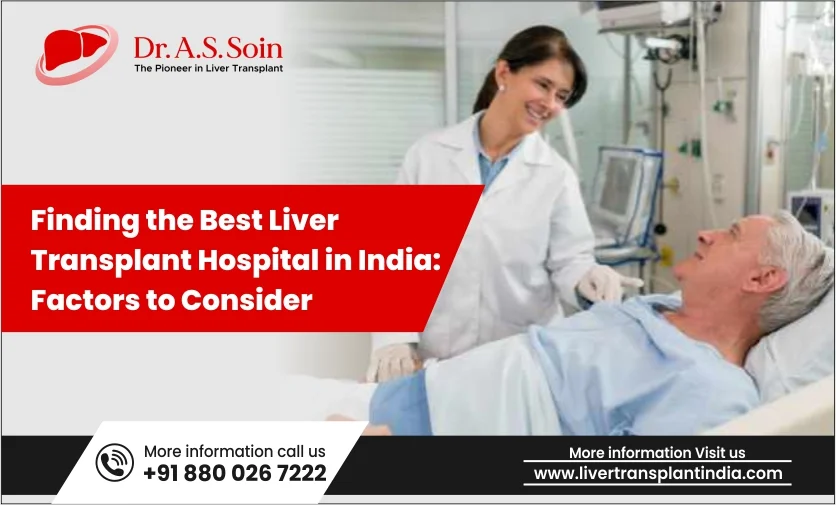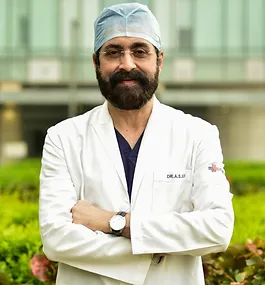When someone is told that a liver transplant is the only way forward, the first reaction is fear and confusion. Where to go? Which doctor to trust? Will the surgery be safe? These are natural questions because a transplant is not a small operation. It’s literally the difference between life and death.
India today has become one of the top destinations for liver transplants — not just for people here but for patients coming from all over the world. But the big challenge for families is not only understanding the surgery, it is about deciding the right hospital. Glossy buildings, fancy ads, or big claims don’t guarantee results. What matters is survival, safety, and long-term care.
So, how do you choose? Let’s break it down.
Table of Contents
ToggleWhy Choosing the Right Hospital Matters
Liver transplant is not like a routine operation. It is one of the most complex surgeries in modern medicine, involving:
High-Risk Surgery Lasting 8–12 Hours
Unlike most surgeries that last 1–3 hours, a liver transplant can stretch to half a day or more. Surgeons have to remove the diseased liver, control massive blood vessels, and implant a new one — often in patients who are already critically ill.
Management of Critical Patients with Liver Failure
Patients coming for transplant are not “stable cases.” They often have jaundice, bleeding issues, kidney problems, or brain complications due to liver failure. Handling such fragile patients before, during, and after surgery requires advanced critical care systems.
Availability of Skilled Anaesthesia and ICU Support
Anaesthesia in liver transplant is a super-specialised field. The anaesthesiologist must manage massive blood loss, rapid fluid changes, and sudden shifts in blood pressure while keeping the patient stable.
Lifelong Follow-Up and Immunosuppressive Therapy
The transplant journey does not end once the surgery is successful. Patients need lifelong medicines (immunosuppressants) to prevent rejection, and these must be carefully adjusted over time. Regular blood tests and liver function monitoring are critical.
The choice of hospital and team determines whether the transplant will be safe, successful, and sustainable in the long run. A small difference in hospital expertise can mean a huge difference in survival.
Key Factors to Consider Before Selecting a Liver Transplant Centre
Before finalising a hospital, families must weigh several crucial factors that can directly influence outcomes.
1. Experience and Track Record
Ask straight: how many transplants has the hospital done?
https://uvs.cfga.gov.mn/
https://revistas.utch.edu.co/
Centres with higher numbers generally have better results. A benchmark is at least 500+ transplants with consistent outcomes. Also ask for their survival rates — the global standard for one-year survival is around 85–90%, and top Indian centres match or even exceed this.
2. Expertise of the Liver Transplant Surgeon
A liver transplant is only as good as the surgeon performing it. When searching for the best liver transplant surgeon in India, consider:
- Their total number of surgeries
- Training background (India + international fellowships)
- Specialisation in both adult and paediatric transplants
- Experience in handling complex/re-transplants
Patients often underestimate this and only focus on the hospital name. But it’s usually the surgeon’s skill and judgment that decides the outcome.
3. Multidisciplinary Team
A transplant is never just about the surgeon. The best hospitals have a dedicated team, including:
- Hepatologists – decide timing of transplant and manage liver disease before and after surgery.
- Gastroenterologists – handle digestive complications linked with advanced liver disease.
- Critical Care Specialists – stabilise patients in the ICU and manage organ support post-surgery.
- Trained Nurses – monitor patients round the clock and manage complex drug regimens.
- Dieticians – plan nutrition for strength, recovery, and medicine compatibility.
- Physiotherapists – help regain strength and mobility after surgery.
https://english.stamforduniversity.edu.bd/
This teamwork ensures smooth management before, during, and after surgery.
4. Living Donor vs Deceased Donor Expertise
India performs more living donor liver transplants (LDLTs) than deceased donor ones due to the organ shortage.
- Ensure the hospital has strong experience in LDLTs – a technically challenging procedure.
- Check whether donor safety protocols are in place.
- For those waiting for a deceased donor organ, the hospital must be linked to the government-regulated organ allocation network.
5. Infrastructure and ICU Facilities
What to check:
- Specialised liver transplant ICUs with advanced monitoring systems
- Infection control protocols (extremely critical for immunosuppressed patients)
- Availability of emergency dialysis and interventional radiology
- State-of-the-art operating theatres
Remember, the best-looking hospital building does not always mean the safest ICU.
6. Post-Transplant Care and Follow-Up
Survival after transplant depends not only on the surgery but on lifelong follow-up.
- Does the hospital have a structured post-transplant program?
- Are there regular monitoring protocols for immunosuppressants?
- Is there 24/7 emergency access to the transplant team?
Patients who live outside big cities need teleconsultation and long-distance care facilities as well.
7. Liver Transplant Success Rate in India
Success rate is a clear marker of expertise.
- The best centres report 90–95% one-year survival in living donor transplants.
- Long-term 5–10 year survival is comparable to the best centres in the US and Europe.
- Outcomes in India have improved https://nova.kampoznanje.si/ drastically over the past two decades thanks to surgeons like Dr. A.S. Soin, who pioneered modern liver transplantation in the country.
8. Cost of Liver Transplant in India
Cost is a practical concern for most families.
- In India, a liver transplant costs between ₹18–30 lakhs, depending on the hospital, complexity, and post-op care.
- This is much lower compared to the US (USD 300,000+) or Europe, but without compromising success rates.
- However, beware of centres that quote abnormally low packages. Safety and expertise should never be compromised for cost.
9. International Patients – Why India is a Global Hub
Many international patients travel to India for liver transplant surgery because:
- Costs are 5–6 times lower than in the West
- Success rates match the best global standards
- Hospitals have English-speaking staff and international coordinators
- Surgeons like Dr. A.S. Soin are globally recognised leaders in transplantation
If you are coming from abroad, ensure the hospital has a dedicated international patient department for logistics, visas, and follow-up support.
10. Accreditation and Ethical Standards
Always check:
- Is the hospital accredited by NABH or JCI?
- Does it follow government rules for organ donation and transplant?
- Are there transparent donor evaluation processes?
These ensure safety and protect both donor and recipient.
https://www.vikendotevrenychzahrad.cz/
https://alumni.riphahfsd.edu.pk/
Red Flags: What to Avoid in a Hospital
Not every hospital advertising liver transplants is truly equipped to deliver safe and lasting results. Families need to be cautious because a wrong choice can affect not just the surgery, but the child’s or adult’s long-term survival. Here are some warning signs that should immediately raise doubts:
1. Very Low-Cost Promises Without Transparency
If a hospital markets itself purely on being “cheapest” without explaining where costs are cut, it’s a red flag. Extremely low packages often mean corners are cut — whether in donor screening, infection control, or follow-up care — all of which can put lives at risk.
2. No Clear Data on Survival Rates
If a hospital cannot provide transparent data or avoids questions about results, it’s a sign that they may not have a consistent experience or proven success.
3. Lack of a Dedicated Transplant ICU
Without a dedicated transplant ICU, the risk of post-operative infections, organ rejection, or complications goes up significantly. Hospitals that skip this investment are not serious about safe liver transplantation.
4. Donor Safety Neglected
Living donor transplants are as much about protecting the donor as saving the recipient. If a hospital does not explain its donor evaluation process — medical, psychological, and ethical — then it’s not prioritising safety.
5. “Borrowed” Expertise
Some hospitals advertise liver transplants but actually depend on visiting surgeons who fly in occasionally. Surgery may happen, but who takes responsibility for complications later? Without a stable, full-time transplant team, follow-up care becomes patchy.
6. Patients Kept in the Dark
Perhaps the most subtle red flag is when families are discouraged from asking questions. If a hospital is unwilling to explain risks, complications, or long-term responsibilities, it is not respecting patient rights.
https://eatmakhana.com/
In short, red flags are rarely hidden — they show up in how transparent, prepared, and committed a hospital truly is. A wise family spots them early and chooses safety over convenience.
Why Dr. A.S. Soin’s Centre Stands Out
When we talk about liver transplant in India, one name comes first — Dr. A.S. Soin. He is the pioneer of this field in the country, with unmatched experience and reputation.
His centre has performed over 3,500 liver transplants, the highest in India. The success rates here are comparable to the world’s best centres. The team is equally strong https://voilamalaga.com/ in both adult and paediatric transplants, which is rare. Patients also benefit from a structured lifelong follow-up program so care continues even years after surgery.
The centre is also known for introducing and perfecting advanced techniques like living donor transplants, minimally invasive donor surgeries, and modern post-transplant care protocols. These make the journey safer for both donor and patient.
For any family looking for the best liver transplant hospital in India, a centre led by Dr. Soin offers not just medical expertise but also trust and assurance.
https://vikendotevrenychzahrad.cz/
Final Word
Choosing the right hospital for a liver transplant is one of the most important decisions a family will ever make. It’s not about shiny buildings or low packages — it’s about survival, safety, and long-term care.
The best liver transplant hospitals in India are those that bring together: experienced surgeons, high survival rates, advanced ICUs, ethical practices, and lifelong follow-up.
https://flash.tas.edu.pk/
If you or your loved one has been advised a transplant, reaching out to an expert like Dr. A.S. Soin and his team could give you the best chance at not only surviving the surgery but living a healthy, full life after it.
https://biodiversityweek.ie/








